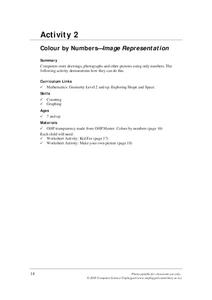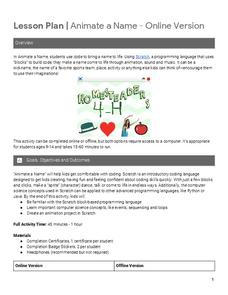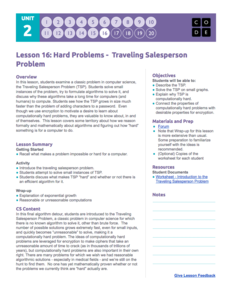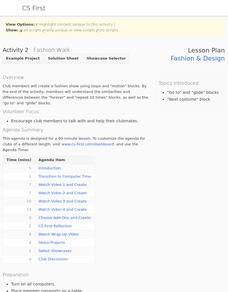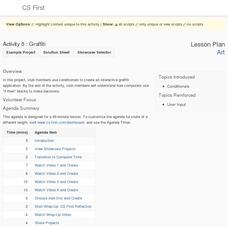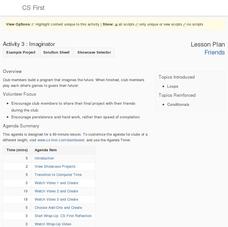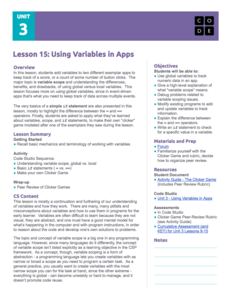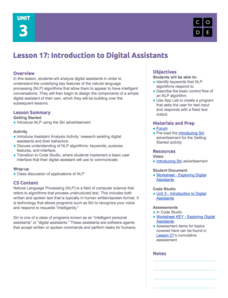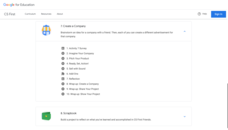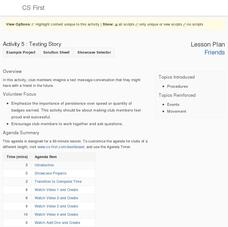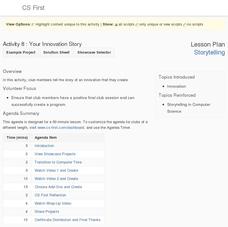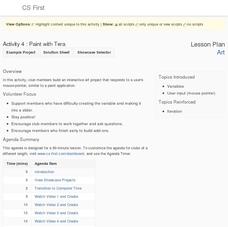Curated OER
Protecting Our Native Forests
Students explore environmental awareness by utilizing computer technology. In this ecosystem conservation instructional activity, students read assigned text which describes the current ecological conditions of Hawaii. Students...
Curated OER
Environmental and Health Concerns
The idea behind this lesson plan is to introduce learners to the health and environmental issues related to the use of computers. The lecture should include topics such as tendonitis and carpal tunnel syndrome, but information is not...
Curated OER
Computer Programming: Learning Alice Programming
Students examine the Alice Program. In this computer programming lesson, students use the drag and drop program method and view a PowerPoint presentation. Students will then create a snowman by using the drag and drop method.
Computer Science Unplugged
Colour by Numbers–Image Representation
How do computers store and send images? Here's an activity that explains one way a computer can compress image information. Pupils decode run-length coding to produce a black and white image. Pairs then work together to code and...
TryEngineering
Program Your Own Game
Young computer scientists get to see what it's like to be a software engineer as they use free online software to design a computer game. They play and evaluate games groups created to round out the activity.
Google
Animate a Name
What's in a name? Pupils use the Scratch code blocks to animate letters in a name. They learn about events, sequencing, and loops in computer science by taking part in the project.
Code.org
Hard Problems – Traveling Salesperson Problem
Even computers find this to be a hard problem. In the eighth installment of a 12-part unit, young computer scientists learn about the traveling salesperson problem. They formulate algorithms to solve the problem and find out why it is...
Google
Fashion and Design: Fashion Walk
Strut your stuff, just on a computer and not on a fashion runway. Scholars program a fashion show animation using block-based computer coding. They learn how to apply different code blocks in writing their programs.
Code.org
Minecraft Hour of Code
Devote an hour to computer coding ... it's time well spent! The activity has young computer scientists write code to solve puzzles in the Minecraft game. They learn how to apply block codes and repeat loops.
Code.org
Personal Innovations
Here's a resource designed to serve as an introduction to a computer science course. Groups brainstorm an innovation that may improve technology or use technology to solve a problem. The plan guides the teacher through the introduction...
Google
Art: Graffiti
Your principal won't mind graffiti, as long as it's on a virtual wall. Scholars use the Scratch block-based computer language to write a program on graffiti. The program lets users place certain designs on a wall.
Google
Adventure on the High Seas
Ahoy there! A fun computer science lesson challenges pupils to write a program that creates an ocean wave. They then develop stories to accompany their projects. All of this takes place within the Scratch coding program.
Code.org
Introduction to Arrays
How can you store lists in a computer program? The 16th installment of a 21-part unit introduces arrays as a way to store lists within a variable. Individuals program a list of their favorite things—adding interest to the activity.
Code.org
Digital Assistant Project
Scholars apply previously learned skills to create a functional computer program. They produce a digital assistant incorporating string commands and complex conditional logic.
Code.org
Looping and Simulation
Young computer scientists continue programming with while loops by creating a program to simulate coins flipping.
Google
Friends: Imaginator
What does a future as a computer scientist look like? Pupils learn about loops in computer coding by writing a story about the future. They include the repeat until and wait blocks in the Scratch program to incorporate these loops.
TryEngineering
Graphics: Bits and Points
What can a mural teach pupils about computer science? The lesson has scholars create a mural on a wall to learn about bitmap and vector graphics. Along the way, they learn about the graphics coordinate system.
Code.org
Using Variables in Apps
Investigate the benefits of using global variables. The seventh installment of a 21-part unit continues the study of variables from the previous lesson plan. Young computer scientists modify two existing apps by adding variables and...
Code.org
Introduction to Digital Assistant Project
How does a computer recognize voice commands? Scholars learn about digital assistants and natural language processing (NLP) algorithms in the ninth lesson of the series. They begin building a simple digital assistant and work on this...
Google
Friends: Create a Company
Create a company, advertise it, and hope it grows. The seventh of eight parts in the Google CS First Friends unit challenges future business leaders to apply computer coding to create an advertisement for a company. After pairs come...
Google
Friends: Texting Story
Sometimes it's okay to text in school. Young computer scientists work in the Scratch program to write a text message conversation among friends. They use different sprites within the program to represent each side of the conversation to...
Google
Storytelling: Your Innovation Story
Explore a trailblazing way to talk about innovation. Using the Scratch coding program, young computer scientists create innovations and write stories to accompany them. They include some of the add-ons they mastered throughout the unit.
Google
Art: Digital Art
There's no need to filter out the project. Future computer scientists set up a program that acts like a photography filter to complete the sixth of eight parts in the Google CS Art unit. They use the turbo mode in the Scratch coding...
Google
Art: Paint with Tera
Here's a creative resource that definitely isn't paint by numbers. As the fourth in and eight-part Art series, learners create a paint program using the Scratch block code. By completing the activity, class members come to understand the...
Other popular searches
- History of Computers
- Computer Science
- Computer Parts
- Personal Computers
- Computer Skills
- Computer Technology
- Computer Literacy
- Computer Teacher Resources
- Computer Basics
- Computer Research
- Computer Supplies
- Computer Dictionaries



